A storm brewing in the coffee cup
Updated: 2016-01-09 02:39
By XU JUNQIAN in Shanghai(China Daily USA)
|
||||||||
Nespresso looks poised to capitalize on the fast-growing market in China where consumers prefer to drink coffee in the comforts of their homes
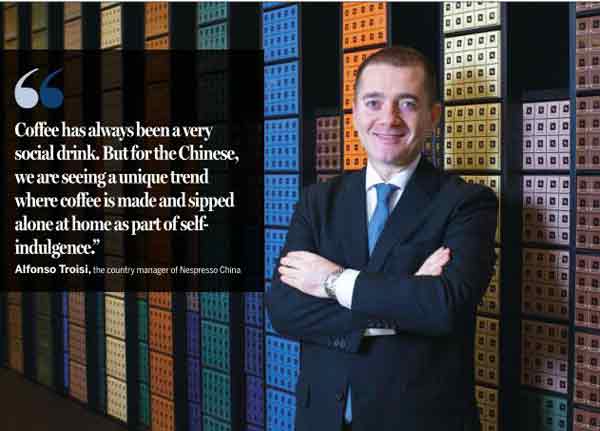 |
| Alfonso Troisi, the country manager of Nespresso China says that though the coffee market in China is still relatively young, the growth potential is undoubtedly immense. provided to china daily |
For Alfonso Troisi, the country manager of Nespresso China, the decision to not use the brand's global ad campaign featuring George Clooney wasn't a hard one to make as he believes that the Chinese market is still not mature enough to relate to the Hollywood celebrity's musings about the product.
With more than ten years of experience in China's beverage market, the Italian said that the tailor-made video clip for the country, one which visualizes flowers, fruits and nuts capsulized into aluminum containers would instead be more appealing to the consumers in the country.
"In China, the ability to choose the type of coffee flavor, for different occasions or moods, has just been established among a very small handful of coffee drinkers," said Troisi, who took over the reins of the brand's China market about two years ago.
"They are very open minded, ready to experiment and taste new flavors," he added.
As a traditionally tea-drinking nation, China has in recent years displayed a raging thirst for freshly roasted ground coffee, turning it into one of the fastest growing markets among the 50 countries that Nespresso has a presence in.
According to a 2015 report by the International Coffee Organization, the production and consumption of coffee in China has experienced double-digit growth for the past few years, with the latter growing at 16 percent per annum over the last decade. Imports of coffee have also grown significantly — 1.4 million bags entered the country from 2013 to 2014, as compared to just 418,000 from 2004 to 2005.
Furthermore, the organization estimates that China currently produces more coffee than Kenya and Tanzania combined, and its consumption has already exceeded coffee-crazy Australia.
Before joining Nespresso, Troisi worked at British alcoholic beverages company Diageo, and it was there that he learned the drinking habits of the Chinese, who loved indulging in baijiu along with a wide range of other western liquors. He attributes this to their ability to quickly adapt and appreciate the excitement that different coffee beans bring.
Coupled with the fact that there has always been a strong tradition of drinking hot beverages in China, even during summer — Troisi estimates the daily consumption to be about seven or eight cups per capita — coffee has inadvertently managed to quickly grow in popularity.
In every Nespresso China boutique, 23 flavors, each labeled with a distinct color, are stylishly displayed. Kazaar, the most intense of flavors, has enjoyed unrivalled popularity here in China.
Chinese consumers have also demonstrated that, as compared to the past when they would rather stay home to enjoy a cup of soluble or instant coffee, they are now more willing to spend at restaurants and cafes in order to try new flavors. However, according to Troisi, the number of people who prefer to savor their coffees at home still forms the majority.
"Interestingly enough, there is a common perception that out-of-home coffee consumption is bigger, which is perhaps due to the high visibility of cafes and people walking with coffee cups in their hands. But it's not yet the case in China, where there is more coffee consumed at home," said Troisi, who added that China has the highest growth rate of Nespresso club members.
He noted that Chinese customers are also very keen to have "a full shopping experience" and most of them spend a minimum of 30 minutes at Nespresso's boutique stores, talking to coffee specialists about their preferences and departing with their own personalized collections.
"Coffee has always been a very social drink. But for the Chinese, we are seeing a unique trend where coffee is made and sipped alone at home as part of self-indulgence," said Troisi, referring to findings from the company's customer research report about the China market. He added that another interesting finding is that Chinese consumers really value their moments of introspection while having a cup of coffee.
The Swiss brand has been one of the most prolific moneymakers for its parent company, Nestle, with reported global sales of $300 million in 2013. Since its introduction in China in 2007, the company has gone on to open six boutique outlets in the country, though it has yet to unveil a flagship store.
"Opening a flagship store in China is something that we are considering to do in the next three to five years," said Troisi in an interview with China Daily USA, prior to the launch of its new Aguila 220 coffee machine in China.
The name of the machine as means "eagle" in Spanish and it is considered a breakthrough in the industry as it allows users to make a cup of coffee as professionally as a seasoned barista. All customers have to do is push buttons.
Troisi sees the new machine as a major growth engine for Nespresso's business-to-business sector in China, given that there is a lack of experienced baristas in China, in addition to other factors such as increasing labor costs and high employee turnover rates in the service industry. The company is targeting restaurants, hotels and cafes with the Aguila 220.
As of 2015, the number of Starbucks stores in China had exceeded 1,500 in more than 80 cities, a clear sign of coffee's growing popularity. However, Troisi believes that there is still much room for growth.
"Our focus for now is mainly on Shanghai and Beijing. The percentage of people in the two cities drinking coffee is still quite low, around 20 to 30 percent," he said.
"But this also means that the opportunities for coffee to flourish in China are huge."
- Obama says US must act on gun violence, defends new gun control rules
- Over 1 million refugees have fled to Europe by sea in 2015: UN
- Turbulence injures multiple Air Canada passengers, diverts flight
- NASA releases stunning images of our planet from space station
- US-led air strikes kill IS leaders linked to Paris attacks
- DPRK senior party official Kim Yang Gon killed in car accident

 Special report: Rise and rise of China's outbound tourism
Special report: Rise and rise of China's outbound tourism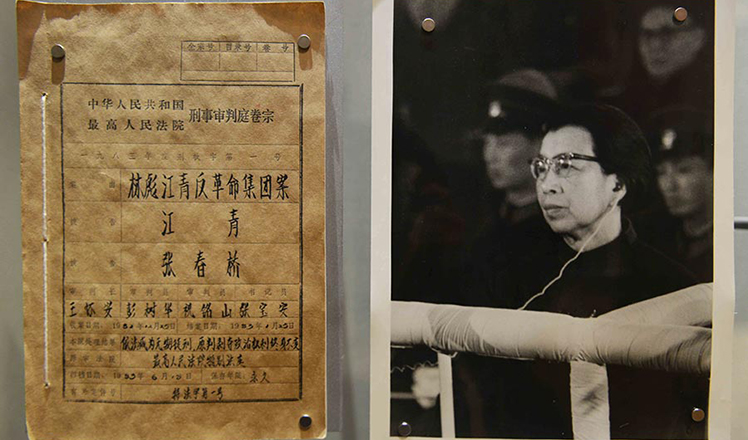
 Trial data of former senior Party officials on display
Trial data of former senior Party officials on display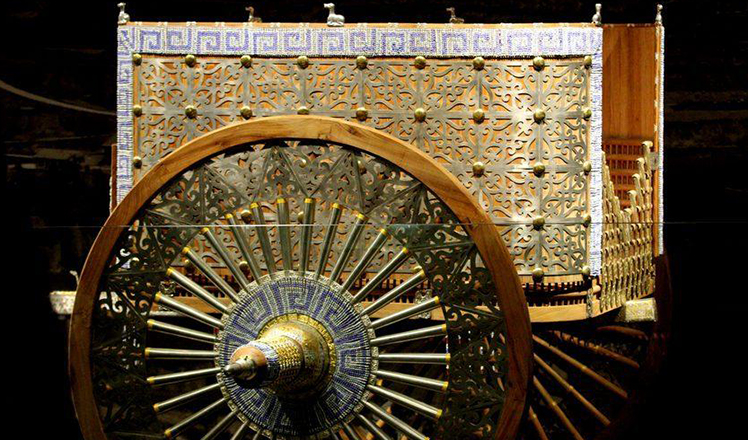
 Replica of luxurious chariot from ancient times wows Xi'an visitors
Replica of luxurious chariot from ancient times wows Xi'an visitors
 Number of giant pandas in China reaches 422
Number of giant pandas in China reaches 422
 Attendees feel the thrill of tech at CES trade show
Attendees feel the thrill of tech at CES trade show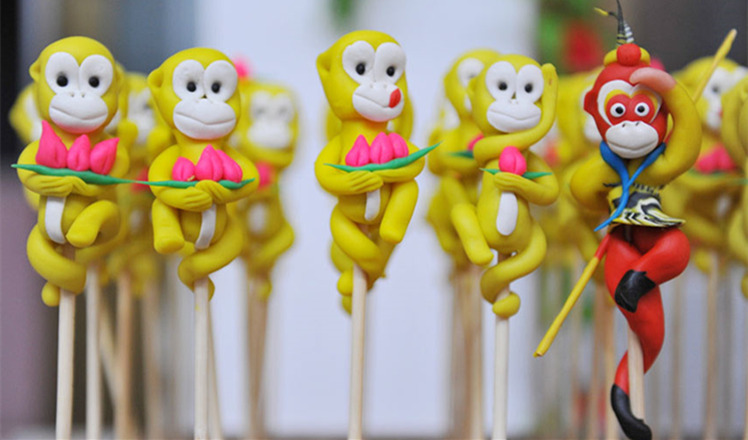
 Vivid dough sculptures welcome Year of the Monkey
Vivid dough sculptures welcome Year of the Monkey
 Kidnapped five-year-old reunites with her family 56 hours later
Kidnapped five-year-old reunites with her family 56 hours later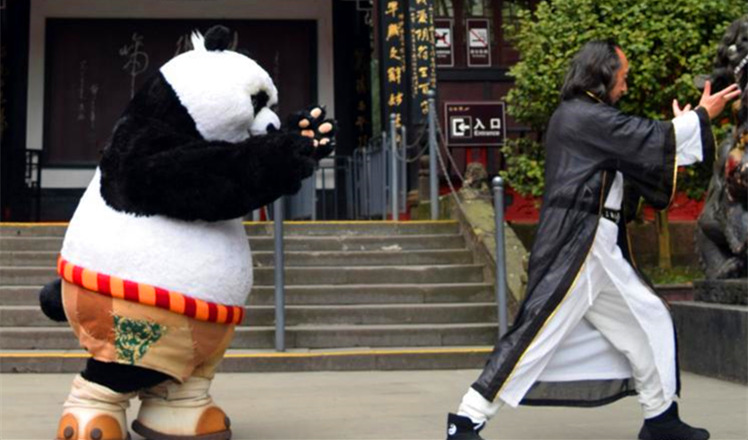
 Kung Fu Panda hones skills from master
Kung Fu Panda hones skills from master
Most Viewed
Editor's Picks

|

|

|

|

|

|
Today's Top News
Shooting rampage at US social services agency leaves 14 dead
Chinese bargain hunters are changing the retail game
Chinese president arrives in Turkey for G20 summit
Islamic State claims responsibility for Paris attacks
Obama, Netanyahu at White House seek to mend US-Israel ties
China, not Canada, is top US trade partner
Tu first Chinese to win Nobel Prize in Medicine
Huntsman says Sino-US relationship needs common goals
US Weekly

|

|







